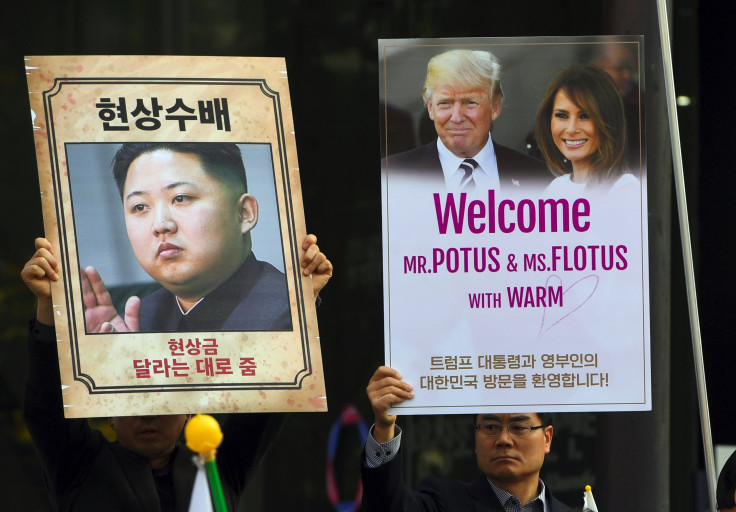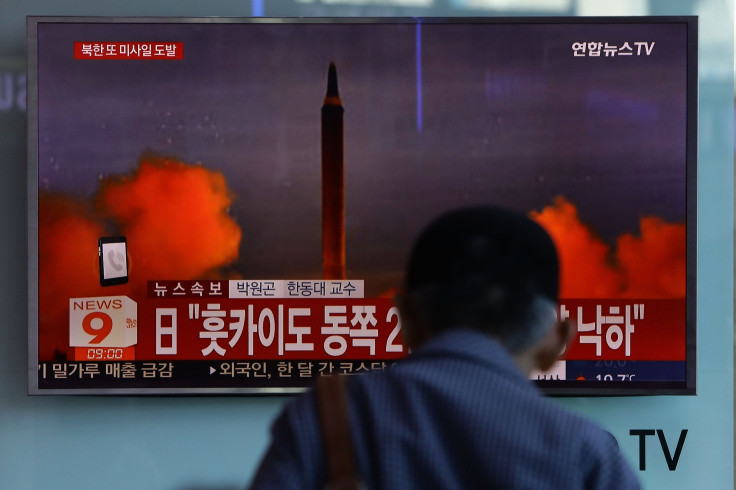North Korea Pledges To Bolster Its ‘Nuclear Sword Of Justice’ Against US

North Korea vowed Tuesday to strengthen its nuclear arsenal as President Donald Trump arrived in South Korea amid heightened tensions in the Korean Peninsula.
Pyongyang has increasingly threatened its neighboring countries and the U.S. in recent times, and has backed up its threat with an ongoing nuclear program and by testing several long-range missiles.
"As long as the U.S. and its followers continue their hostile acts against us, we will further bolster our nuclear, precious sword of justice," the Rodong Sinmun — the mouthpiece of the North's ruling party — said in a commentary, South Korea’s state news agency Yonhap reported.
North Korea also condemned the U.S. for provoking it by sending three nuclear-powered aircraft carriers near Korea even as Trump was visiting allied countries in the region.
Trump landed in South Korea after visiting Japan for two days as part of his 12-day trip to five Asian nations including China, Vietnam and the Philippines. His tour comes in the wake of North Korea's intercontinental ballistic missile launches and sixth nuclear test in the last few months.
“The era of strategic patience is over. Some people say my rhetoric is very strong, but look what has happened with very weak rhetoric in the last 25 years,” Trump said Monday after holding talks with Japanese Prime Minister Shinzo Abe. Trump branded North Korea a “menace” and “a threat to the civilized world and international peace and stability.”
After Trump’s speech, North Korean Central News Agency (KCNA) condemned the “foolish remarks” made by the president at the Japanese air base.
Last week, North Korea slammed Trump criticizing his mental health and calling him “incurably mentally deranged.”
“[Trump] disclosed his true nature as a nuclear war maniac before the world and was diagnosed as ‘incurably mentally deranged,’” KCNA said. “He absolutely needs medicine for curing his psychical disorder.”
North Korea's supreme leader Kim Jong Un made similar statements in September, calling the president “deranged” in a statement circulated on KCNA.
“The mentally deranged behavior of the U.S. president openly expressing on the UN arena the unethical will to ‘totally destroy’ a sovereign state, beyond the boundary of threats of regime change or overturn of social system, makes those even with normal thinking faculty think about discretion and composure,” Kim said, according to KCNA.
North Korea has refrained from any provocation for more than 50 days since its testing of an intermediate-range missile over Japan in September. However, South Korea’s spy agency said earlier this month that Pyongyang might be preparing to conduct another nuclear test after "brisk activity" was spotted at a nuclear research facilities base.

Trump had vowed in September that North Korea will face "fire and fury" and further provocation from the reclusive country could result in a preventive military strike.
However, a renowned American expert on the North Korean issue said last month that the U.S. would not remove all of North Korea's nuclear and ballistic missile capabilities.
"A preventive military strike would not destroy all of North Korea's capabilities. It would risk a wider war that would inflame South Korea and Japan and potentially cause millions of casualties," Michael Green, vice president for Asia at the Center for Strategic and International Studies (CSIS), said in October during a meeting with South Korean journalists in Washington, D.C.
On Monday, former U.S. Secretary of State John Kerry accused Trump of stepping “over the line” with his threats to annihilate North Korea. Kerry specifically mentioned that Trump’s rhetoric might lead to “the risk of tweeting yourself or insulting yourself into a position where something happens.”
“It’s given North Korea a reason to say, ‘Hey, we need a bomb, because if we don’t have a bomb, we’re going to not be able to protect ourselves and they’ll come after us,’” Kerry said in an interview with CNN’s chief international correspondent Christiane Amanpour.
© Copyright IBTimes 2024. All rights reserved.




















